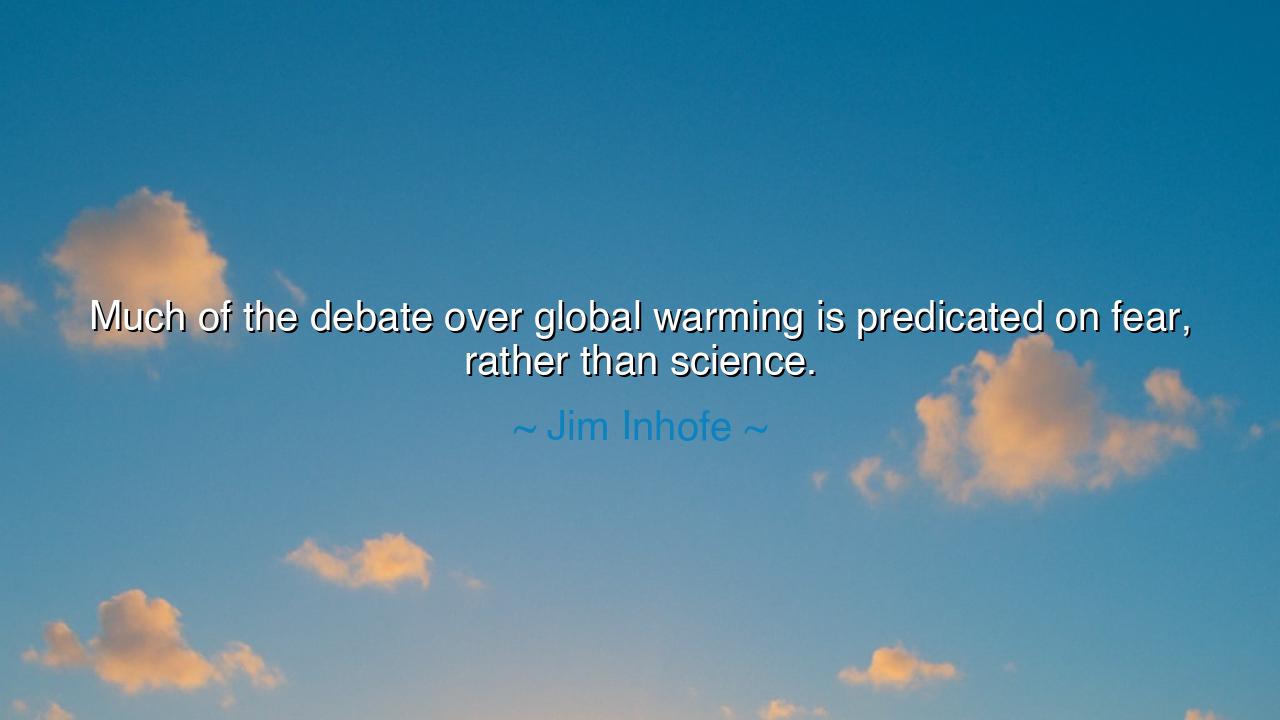
Much of the debate over global warming is predicated on fear






In the bold and controversial words of Jim Inhofe, a man known for his defiance against prevailing tides of opinion, we hear a challenge that pierces to the core of modern discourse: “Much of the debate over global warming is predicated on fear, rather than science.” These words, though spoken in the language of politics, carry a far older lesson—a warning from the dawn of human thought. For every age faces its own storms of belief and emotion, and in each, the wise must learn to distinguish between fear and reason, between the trembling of the heart and the clarity of the mind.
Inhofe’s declaration is not merely about climate; it is about truth itself. He reminds us that when fear becomes the master of our thoughts, wisdom is the first to flee. From the beginning of civilization, men have sought to understand the forces that shape their world—fire, flood, storm, and drought. Yet in times of uncertainty, fear has often risen like a shadow, casting doubt and division among them. To question fear is not to deny danger; it is to demand understanding. And this, Inhofe implies, is the sacred duty of every seeker of truth—to ask: Do we act from knowledge, or from the ghosts of our own anxieties?
The ancient Greeks knew this struggle well. In the city of Athens, during times of plague and famine, the people would turn to oracles and superstition, abandoning the reasoning that had once made them great. Yet there were those—like Socrates—who stood firm amid the hysteria, urging his fellow citizens to think, to question, to reason before reacting. For he knew that fear, when unexamined, blinds the mind, leading even the wisest into folly. Inhofe’s words carry that same spirit of dissent: that no matter how urgent the cry, the path of wisdom demands reflection, not panic; inquiry, not obedience.
Yet let us not misunderstand his message. To question the role of fear does not mean to ignore the environment or to deny the power of nature. It means to guard against the tyranny of emotion that can distort judgment. For fear, when left unchecked, becomes a weapon—used by those who wish to command through dread rather than persuade through truth. Inhofe, in his own way, reminds us that when policy is built upon panic, it becomes fragile, reactionary, and often unjust. Only when it is rooted in science, in clear-eyed observation and reason, can it endure and truly serve the good of all.
History offers a mirror for this lesson. In the fourteenth century, as the Black Death swept across Europe, terror gripped the people. Many turned upon one another, blaming witches, strangers, and the innocent. Cities burned, not from plague, but from fear. Only later did humanity learn that the true cause lay not in curses or divine wrath, but in the small and unseen world of disease. So too, Inhofe warns, must we guard against letting fear lead us to error in the modern age. For when fear rules, truth is silenced, and reason—the light of human progress—dims.
Still, his words call not for cynicism, but for balance. There is a wisdom in caution, but greater wisdom in discernment. We must neither dismiss the warnings of the world nor bow blindly before them. Let our actions for the earth be guided not by terror, but by understanding, by study, by honest inquiry. The scientist, like the philosopher, must seek not comfort in certainty, but courage in complexity. For the truth is rarely simple, and often lies beyond the reach of slogans and fear.
So, O seeker of truth, learn this from Inhofe’s challenge: when the world trembles and cries out in alarm, pause before you answer. Ask whether the voice you hear is that of reason or of fear. In every debate, in every cause, let your compass be curiosity, not panic; evidence, not emotion. For the one who learns to think clearly amid confusion becomes a light to others in the dark.
And remember this final truth, passed down through all ages: fear may awaken us, but only reason can guide us. Let your heart care deeply, but let your mind steer wisely. In this harmony lies the true strength of humankind—the power not only to protect the world, but to understand it, and in understanding, to preserve it with both wisdom and peace.






AAdministratorAdministrator
Welcome, honored guests. Please leave a comment, we will respond soon